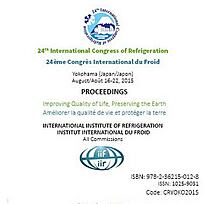
Document IIF
Modélisation 3D et numérique transitoire des processus d'ouverture et de fermeture de porte et leur influence sur la performance thermique des chambres froides.
3D and transient numerical modeling of door opening and closing processes and its influence on thermal performance of cold rooms.
Numéro : pap. n. 176
Auteurs : CARNEIRO R., GASPAR P. D., SILVA P. D.
Résumé
The need of rationalize energy consumption in agrifood industry has fasten the development of methodologies to improve the thermal and energy performances of cold rooms. This paper presents a 3D transient Computational Fluid Dynamics (CFD) modelling of a cold room to evaluate the air infiltration rate through sliding doors. A species transport model is used for modelling the tracer concentration decay technique. Numerical predictions indicate that air temperature difference between spaces affects the air infiltration. For this case study, the infiltration rate increases 0.012 m3 s-1 per K of air temperature difference. The knowledge about the evolution of air infiltration during door opening/closing times allows to draw some conclusions about its influence on the air conditions inside the cold room, as well as to suggest best practices and simple technical improvements that can minimize air infiltration, and consequently improve thermal performance and energy consumption rationalization.
Documents disponibles
Format PDF
Pages : 8 p.
Disponible
Prix public
20 €
Prix membre*
Gratuit
* meilleur tarif applicable selon le type d'adhésion (voir le détail des avantages des adhésions individuelles et collectives)
Détails
- Titre original : 3D and transient numerical modeling of door opening and closing processes and its influence on thermal performance of cold rooms.
- Identifiant de la fiche : 30015343
- Langues : Anglais
- Source : Proceedings of the 24th IIR International Congress of Refrigeration: Yokohama, Japan, August 16-22, 2015.
- Date d'édition : 16/08/2015
- DOI : http://dx.doi.org/10.18462/iir.icr.2015.0176
Liens
Voir d'autres communications du même compte rendu (657)
Voir le compte rendu de la conférence
Indexation
-
Energy analysis and heat loads calculation appr...
- Auteurs : GONÇALVES J., NUNES J., SILVA P. D., et al.
- Date : 16/08/2015
- Langues : Anglais
- Source : Proceedings of the 24th IIR International Congress of Refrigeration: Yokohama, Japan, August 16-22, 2015.
- Formats : PDF
Voir la fiche
-
DOORS FOR HIGH RISE REFRIGERATED STORAGE.
- Auteurs : COLEMAN R. I.
- Date : 1983
- Langues : Anglais
Voir la fiche
-
A modified model to predict air infiltration in...
- Auteurs : CLELAND D. J.
- Date : 2004
- Langues : Anglais
- Source : ASHRAE Transactions. 2004 Winter Meeting. Volume 110, part 1 + CD-ROM.
Voir la fiche
-
COLD STORAGE DOORS: LIFE CYCLE COSTING REPAIR O...
- Auteurs : MINER S. M., BALBACH G. C.
- Date : 24/08/1987
- Langues : Anglais
- Source : Development in refrigeration, refrigeration for development. Proceedings of the XVIIth international Congress of Refrigeration.
- Formats : PDF
Voir la fiche
-
Using computational fluid dynamics modelling to...
- Auteurs : FOSTER A., SWAIN M.
- Date : 28/03/2001
- Langues : Anglais
- Source : Rapid Cooling of Food.
- Formats : PDF
Voir la fiche
